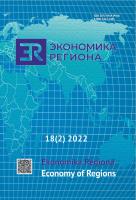Policy Uncertainty, Oil Price, Stock Market and Precious Metal Markets Volatility Spillovers in the Russian Economy
Policy Uncertainty, Oil Price, Stock Market and Precious Metal Markets Volatility Spillovers in the Russian Economy
Author(s): Kazi Sohag, Shaiara Husain, Kristina Vladimirovna Chukavina, Md Al MamunSubject(s): Economy, National Economy, Energy and Environmental Studies, Financial Markets
Published by: Институт экономики Уральского отделения Российской академии наук
Keywords: volatility spillovers; TVP-VAR; policy uncertainty; oil price; exchange rate; metal price; gold price; stock index; silver price; Russian Federation;
Summary/Abstract: The Russian economy is emerging, meaning that natural resources play a dominant role in economic development. Given the considerable volatility in resource prices, we investigate the volatility spillovers among policy uncertainty, international oil prices, exchange rate, stock index and metal prices covering the period of 2 July 2008 to 15 May 2020 for the Russian economy applying Dynamic Connectedness based on Time-Varying Parameter Vector Autoregression (TVP-VAR). Our empirical investigation demonstrates that gold price, Russian policy uncertainty, oil price and stock index are net volatility contributors, whereas palladium, platinum, silver and exchange rate are net volatilities receivers. Market capitalisation and silver market are found to be the highest net contributor and net receiver, respectively. The palladium appears as a net volatility receiver initially, just after the global financial crisis. The Russian economic policy uncertainty appears to be the dominant volatility contributor from 2008 to 2014, but onward it turned to be a net volatility receiver. Over the year 2014, gold price was the prominent volatility contributor to another market when the oil price dropped significantly. The total connectivity of the markets are highly anchored with several exogenous shocks, including economic sanction, adoption of floating exchange rate, oil price plunge. Our empirical findings provide several policy implications to portfolio managers and Russian regional stakeholders.
Journal: Экономика региона
- Issue Year: 18/2022
- Issue No: 2
- Page Range: 383-397
- Page Count: 15
- Language: English

